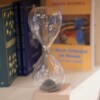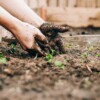
Sunset Cue
I once heard a sarcastic remark after attending a poetry reading. Perhaps I made the remark. At any rate, the reading featured a past-middle-aged poet reading newish poems from the latest book—the tenth or so—this poet had written. The sarcastic comment: “I sip my coffee as I gaze on the birdfeeder out my window. I write as I contemplate the birds. I am important.”
It’s an indictment on a few features of the life and times of poetry. When poetry is written by aging university professors living in comfortable suburbs, trained in the easy- come, easy-go personable ethos of the postmodern era, the result is too often preciosity, nostalgia. God help us.
Angie Macri’s newest collection, Sunset Cue, winner of the Lauria/Frasca Poetry Prize, might be mistaken—at brief glance—for another birdfeeder production, for all its talk of robins and cardinals and flycatchers. But that characterization would be mistaken. The title poem that opens the volume, “Sunset Cue,” should make clear that Macri’s birds don’t lead us back into the poet’s own precious feelings. They lead us up, or out—definitely beyond—to contemplate not the personal, but the metaphysical, or, Greek-like, fate itself.
It is the tyrant’s custom to wear the sun under his wings,
to show the sun when challenged
in the pulse of aerial
display. His tail cuts,
not as the state cut the route
through the forest between the city and dam
but as space cut and come together
without a seam,
the kind of cut that heals
itself without a scar,
absolute rule which he reveals.
He sits on the road signs (for curves, for speed,
use caution please)
in his territory, his mate
lining a nest with cigarette filters
from the shoulders of the highway.
The ore in this place
has made man a king.
Like law, like ore, a sun
fits under the flycatcher’s wing.
Macri succeeds at simultaneously celebrating beauty and recognizing the price paid for it. No free lunches, someone once said. It would take the most dour of democrats not to appreciate the elegance in the power of the flycatcher (family Tyrannidae) in the way he cuts space, so that it “heals itself without a scar,” or not in any way to venerate the “absolute rule which he reveals.” However, its beauty/power reveals the “law” under which both man and nature often chafe. Macri is always attuned to these deep ironies.
“Conclave” is about cardinals—a favorite subject of birdfeeder poets. But this astonishing poem pushes beyond personal pieties, loves, or griefs as it works—as I think only poems can work—to exteriorize a mystery: the mystery of redness. She begins with the overflow of redness:
This winter, there are so many cardinals
the woods can’t hold them. They overflow the roads
and railroad crossings like flames a child
is criticized for drawing: shouldn’t fire be orange or yellow,
maybe some combination? […]
But redness, we come to see, isn’t about combinations or compromises. It’s about flooding— going whole-hog.1 The child’s mother tells her that long ago “cardinals were collected / and sold north as songbirds”—an attempt to capture, control, and tame. The poem concludes:
[…] red fire completely, they move as the path a swordis cutting. With such a big box of crayons,
there are so many more choices like orange-red, and red-orange: side
by side, can’t you see the difference?
Why would you ask for one named blood?
They sang better, her mother has read, if captured
rather than born in captivity.
No one is left alive that remembers.
The mystery of redness, that fire unquenchable, undiluted, pure, and fanatical, which can burn within oneself secret as a “conclave,” but may unexpectedly and brilliantly flame out- ward and visible against “forests / that hold the shades of ashes”—Macri has exteriorized this mystery through scenes of nature, a school coloring assignment, and a tidbit of history about captured birds. Poetry works magic in such hands.
Most impressive in Sunset Cue is Macri’s staving off preciosity in poems that, thematically, could drift toward the saccharine or sentimental. Macri’s great achievement is that she has written what I will call “pro-life” poetry. Ever since Robert Lowell, Sylvia Plath, and the Confessionals, family life in serious poetry has been treated as the site of burden and restriction at the least, or horror and trauma at the worst. On the other hand, poetry continues to be written in the greeting-card fashion that celebrates motherhood, childhood innocence, and the traditional family structure—just not in a way that serious artists can appreciate. Macri’s poetry, though, presents depth, complexity—even irony—all while leaving readers with a positive sense of heritage, family, childhood, motherhood, and, yes, even fatherhood. It’s pro-family, and, therefore, pro-life.
This is a poetry populated by mothers and fathers, children and grandparents—all loving, caring, and devoted. No one hides secret incestuous lusts or dark desires with selfish intentions. Yet, the poems are not sappily sentimental. They hold themselves together with the same dignity and complexity that holds families themselves together. Here we see the trials of intimacy, of hopes and desires, of struggles to hold on to innocence and keep loving even as time and circumstance bring change and loss. Is it possible that the family could make a comeback in serious literature? Perhaps poets like Macri have finally found a mode for the writing of such themes beyond the pieties of Little Women or 19th-century hymnody.
Macri celebrates heritage and the power in activities that bind family through time in “The Steel My Father Sharpened,” which ruminates on the speaker’s child taking up the spade she once wielded, breaking up clods, along with his grandfather:
[…] They break apart root from rootwith solid same hands. The clod opens to air.
I watch my father and son break it down.
And in “Breakers,” Macri’s speaker questions how her son can stand up as she watches him venture into the waves on a beach. The waves, in the mother’s mind, become the entirety of the experience of heritage—a grandfather who immigrated from Italy, across the ocean:
[…] Underthe names of sailors, soldiers
saints from my grandfather’s world
of swordfish
and lamb, caciocavallo
and cuzzupe di Pasqua
the flowers of zucchini
how can my son
stand?
And Macri gently, yet firmly, handles the trials of family, such as what to reveal to a child of darker truths in “In the Labyrinth of the Smallest Bone”: “Are there ghosts? my son asks. / Only in dark castles far away from us.” Or how a very non-patriarchal father handles a strong-willed daughter who could call “him / by his first name, like a friend.” Not Plath’s “Daddy,” this is a man “who didn’t care she wasn’t / a son, that he never had a son” (“Purple String”). And we see a father’s inner struggle with clinging too tightly to that daughter’s destiny in “Don’t leave. Stay here forever, said the father,” realizing that to force-feed love ends up in a “dead sea”:
[…] which has no outlet, metalto turn the hearts of fathers
to their children
before the face to prepare
their ways. The curse
of the earth,
the arrival
from the barren, is born
from what can’t speak.
“Dame’s Rocket” makes a case for pro-life poetry in its positivity and complexity. Dame’s rocket is a fast-growing flowering plant that springs up in ditches and other small places where water pools. The poem brilliantly captures a mother’s canny sense of her daughter, how she hears and feels her laughing before she laughs:
[…] The soundboils up inside so that
I can feel it in her back
before I hear her laughing,
like grapes each laugh,
like bulbs of lung that send
air out and clench the new
with joy and comprehension.
The deep connection, the family tie, is the dame’s rocket, or common beauty flowering in abundance. But more knowledge of botany is useful for understanding the poem’s finish.
Brought here from Europe
long ago, this is their home now,
like us, mothers and daughters
back to the first ones born
in bluebells of wilderness
and close rain that infuses all.
My cells’ energy is hers
and will be in her children, too,
an atlas to the past like chains
of ferns with fronds,
fiddleheads, and sori
underneath for the next of us.
Sori are clusters of spores found on the underside of fern leaves, often mistaken for an invasive fungal disease by those unlearned of ferns. But sori are vital for the plants’ reproduction. This is a metaphor for our time: that which is vital for life and health and, yes, reproduction, is misunderstood, vilified, in attempts to cast off what we come from and what we most need to survive into the future. And it’s because we can’t find the beauty in the common flower and have left off the training that helps us see its complexity.
One sees the necessities of feminism, and one can read feminism into Macri’s poems as well, especially in “Graeae, What We Share,” which reads as a celebration of war-like strength within womanhood that doesn’t pose for a male gaze. But in the 21st century, in the wake of Plath and Adrienne Rich and a host of feminist poets who have not failed to rage, it seems time to admit that in this feminist moment we’ve missed something, as we do in all moments. And what we’ve missed is the value of women with men, with grandfathers, with children at home in a stable, sane family. And we also miss marriage. But Macri gives us this too, as in “Waterweed,” where—as only an expert poet can do in words—the science of cytoplasmic streaming is combined with music and weaving in describing “elodea,” a species of plant often viewed as a nuisance. But Macri is also describing a woman being wed.
[…] rise as whitebloom on the surface where air exchanges
with liquid, where marry is triplets of notes
on clefs of depth and shimmer
with no aisle but the steady, daily sun, I wrap
in fluid sheen and break and root again.
This is not feminist angst and neither is it Hallmark romanticism. It’s the reality of womanhood, being given in marriage, losing herself, woven into another reality, being broken only to set down roots again.
Macri helps us contemplate what I think is for most people the truer reality than feminism’s and confessionalism’s dark portraits of the 20th-century family: that husbands and wives can love each other, that families can be fertile beds of flowering affection, and that children are a blessing. She writes in “Oh Be a Fine God, Kiss Me” lovingly of a husband who gave her sons, gave her the experience of motherhood: “you who bent to my face / and gave me a taste, / gave them to me.”
























Thank you. What a treat, this review. That poetry can bring such health, so carefully.
Thanks for your encouragement! It means a lot.
What a beautiful review! I’ll now look at the red cardinals out the window in a whole new way. Thank you for enriching our lives.
Thanks for your response, Perry. I appreciate all the work you do for this venue.